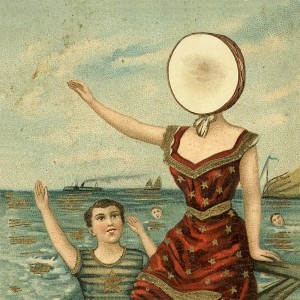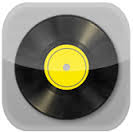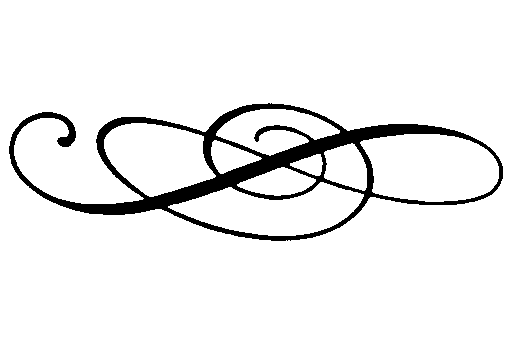

 Neutral Milk Hotel
Neutral Milk Hotel
| Release date | Label | Producer | Genre | Length | More info |
| 1998.02.10 | Merge/Domino | Robert Schneider | Singer-Songwriters | 39:55 |  
 |
Introducing St. Anne Frank as the Holy Protectress of all vocally challenged indie kids.
Background
In all honesty, there is very little significant background to this record. In 1998, the world sure as hell wasn't expecting to be taken by storm by a slightly non-conventional singer-songwriter, armed largely with an acoustic guitar, and a bunch of his trumpet-blowing friends: the taste-based, creatively demanding part of it was getting accustomed to living in the age of King Yorke and Queen Björk, and the indie kids, I think, were generally happy that the massive "sellout" wave of the early 1990s, spearheaded by Nirvana, was finally over and they could now have their new basement idols all to themselves, to be shared and admired in small insider circles. That seemed largely to be the deal with the "Elephant 6" bands, a loose agglomeration of indie collectives with a common history, all of whom specialized in sonically retro-oriented, but intellectually modern art-pop with a psychedelic edge: Apples In Stereo, Olivia Tremor Control, and Neutral Milk Hotel all among them. Largely due to the "archaicness" of their sound, as well as an intentional lack of excessive promotion, their fanbase was never too huge, but it was loyal, and critics tended to respect them, too.
Nevertheless, out of all the (rather impressive) musical baggage that the Elephants had accumulated over more than two decades of existence, not a single piece of product earned as much retrospective admiration as Neutral Milk Hotel's last record. Its rise to fame did not occur until sometime around the mid-2000s, by which time it began to be proclaimed as not only the best Elephant 6 album ever made, but one of the best albums of the 1990s and, eventually, one of the best albums ever (and I have even seen with my own eyes written fan claims to it being the best album ever, period). Consequently, it might make more sense to discuss not the background of the record itself (which is largely a personal matter of Jeff Mangum's), but the reasons why it took so long for it to break out of the "cult classic" status into a much more mainstream conscience - and, indeed, when you confront it with the indie rock scene of the 2000s, everything from Arcade Fire to Beirut and beyond, it is possible to see how it was really somewhat ahead of its time in 1998, and how it would better appeal to an early 21st century conscience than a late 20th century one. But read on to find out.
Some basic factsThat said, a huge chunk of the album does consist of nothing but Mangum and his acoustic guitar, which is why it can be safely placed in the general "singer-songwriters" category - the bombastic arrangements tend to be secondary compared to the sparsely arranged parts, and the music is largely taking orders from Mangum's poetic and artistic vision, rather than vice versa: a vision that was, as everyone knows, largely inspired by the man's immersion into The Diary Of Anne Frank, even if it produced a highly unpredictable reaction. This might also explain why Mangum disbanded Neutral Milk Hotel the very same year that the album was released: he seems to be a natural loner/maverick who feels much better on his own than surrounded by bandmates, and the fact that he has made very few public appearances or released any new music ever since only confirms the mystery (and makes him an even tastier object of admiration for the wound-up hipster in need of a holographic companion with a permanently broken heart).
Naturally, the album did not sell much upon its original release; today, however, Billboard charts mark more than 140,000 copies sold as compared to but a measly 5,000 for the record's less fortunate predecessor, On Avery Island, and - perhaps not surprisingly - most of these copies seem to be vinyl ones rather than CDs, because, well, cool works of art like these should be owned on something more classy (and long-lasting) than a cheap laserdisc. (For even better effect, I do believe that the vinyl LP should be sold in a twin package with a bottle of Domaine De L'Ecu Muscadet - double the charm in an unforgettable mix of pleasure and misery!). Likewise, the amount of panegyrical reviews on professional and amateur websites has been increasing in geometric progression for the past 10 years, pretty much burying the entire Elephant 6 scene under them: poor Robert Schneider (a very cool and talented musician himself) only wishes, I guess, that he could have at least a dozenth part of those accolades, and by now it seems that his case is pretty hopeless. Let's try and see why that is for ourselves.
For the
defense
It is useless for me to begin the main body of this review by trying to pretend to being an admirer of this album - for the most part, its charm fails to work on me, and without that magic touch, its flaws vastly outnumber its virtues, or, at least, are so serious as to throttle its chances of being counted as a masterpiece, let alone "the greatest album ever made". But still, virtues first, and the first virtue of In The Aeroplane Over The Sea is this: IMHO (which stands for "in my honest opinion"), Jeff Mangum is anything but a poseur.
Actually, yes, that is an important point. Any dickhead (excuse me) can pick up an acoustic guitar, glue some generic chords together, write some bad poetry, and pretend to be making us all a generous donation of the unique, insightful vibes of his unique, insightful personality. Some of these dickheads might even be lucky to grab a recording contract, and a few are luckier still to get airplay and publicity - and this almost automatically guarantees some sort of fanbase, because people are plenty and people are strange. (Then there's truly magical stuff, like the combination of a dickhead, a beard, and a secluded log cabin... oh, don't get me started). Well, to cut to the chase, I'm certainly not Jeff Mangum's biggest fan, but he ain't a dickhead - he's got some talent to burn, and he is not burning it in a conventional, mass-marketed furnace, which usually comes along with the instruction "whine and bleed and mix tears and blood and write I'M SO VULNERABLE with them on your sleeve" (the record's, that is). No, he's definitely a more intriguing figure than that.
I am also not going to pretend that I "understand" any of the man's lyrics, or even properly "get" whatever it is for which he is using Anne Frank as a symbol (because, if anything, In The Aeroplane is not a Holocaust tribute, not even a thickly veiled one). I don't think they matter nearly as much as the majority of the album's printed or web-published descriptions would have you believe - in fact, I don't even think that there are any specific "key lines" here, like there are in Dylan songs, to act as primary stimulants, and I do believe it is pointless to make wild guesses about why the boy is two-headed, or why "semen stains the mountain tops" (this seems to be the most commonly debated and discussed line in the whole album, BECAUSE GROSS GROSS GROSS) and what precisely this has to do with the communist's daughter. What matters is that he sings it all as if it all made sense - with intonations that alternately suggest dumb admiration of some heavenly beauty, unmotivated outbursts of passionate village idiocy ("Jesus Christ I love you" is a prime example - not the words, of course, but the way they are delivered), insistent, tense pleading (the entire ʻOh Comelyʼ is one large tearing plea), and an odd brand of sermonizing, as when you get chased in the street by some crazyass sect member who does not even speak your language too well, but he knows he just got to make you understand, or his soul will be forfeit.
Roughly speaking, this is a sincere album, communicated to us in its own tongue that makes as little sense verbally as it does musically. From a musical standpoint, the one thing that stands out about Aeroplane is its odd stylistic melange - at its heart lie some very simple, very repetitive acoustic guitar patterns, and if the only thing to disrupt them were the occasional breaking out of thick distorted power-pop electric guitar, that'd be comprehensible; but much of the time, the music is accompanied with zydeco accordeons, New Orleanian brass (the guy was born in Louisiana, after all, remember?), various old-fashioned organ overdubs, and all sorts of disconcerting, disorienting sound effects that give the feel of a hot, damp, lazy afternoon, teaming with organic life but no sense of direction or purpose whatsoever. No wonder that the individual songs are rarely memorable, and the entire record runs on atmosphere/feel rather than actual melodic hooks. Although, admittedly, I would not be so honest if I said the record is completely devoid of them: ʻHolland, 1945ʼ is as good a folk-pop song as any, and would have sounded great on any country-western album with a banjo on my knee. It is certainly the merriest song about Anne Frank ever written, that's for sure, and is bound to send her spirit pirouetting in the sky. (Actually, here's a great idea for an aspiring filmwriter: how about a script where Jeff Mangum dies and goes to Heaven and actually finds Anne Frank and plays her In The Aeroplane Over The Sea?..)
Anyway, it is pretty easy to see why the record was singled out of the entire Elephant 6 backlog: it obviously makes an effort to suck you inside this guy's personality, offering you a certain spiritual vibe to adopt for your own purposes, and it is quite intimate - unlike any track by, say, Apples In Stereo, many of which are musically superior but never convey the impression of "coming straight from the guts". It is more of a singer-songwriter album than a psychedelic pop album, and yet, at the same time, it has enough elements of psychedelic pop to make it superficially more attractive than the average folkie confessional. And although Mangum still comes across as way too normal to truly qualify as "The 1990's Syd Barrett", there's a definite echo of Syd in him - the aura of childishness, the ability to move from happiness to depression in a twinkle, and that passionate, unquenchable desire to tell you something, make you understand at all costs, even if it's practically hopeless because we don't really speak the same language. And he does that without being too gloomy, like Elliott Smith, or too romantically distant, like Jeff Buckley. I mean, you could probably have this guy as your friend, even if you'd probably have to keep an eye on him lest he burn down the kitchen or something. Right?
For the prosecution
Oh boy, where do we even begin. Okay, let's pick at a single song for starters: to my ears, ʻOh Comelyʼ sounds plain unbearable. Six minutes of musically trivial acoustic strum, accompanied with sincere, but sonically brutal singing from a guy who - let's put it mildly - was not born and reared for this kind of singing; good old Keith Richards couldn't have done a worse job than what Mangum does here, especially when he tries to go real high at the end of each verse. Honestly, I don't know about you, but to me, it's plain sonic torture, and I have no idea why I should be enduring it, or why I should "respect" this awful off-key vocal racket as a symbolic representation of sincere, unadorned suffering. (And I don't even have a proper idea of what he's suffering about - is it horror at Anne's fate, or desperation at the fact that she's there, and he's here, and she can't "let her skin begin to blend itself with mine"?).
The thing is, I am as much of a sucker for sincerity and originality as anyone, and I heartily welcome unconventional approaches to singing and playing (I do love Björk, remember?), but the problem with Aeroplane is that its approach is not "unconventional" - it is simply un-existing. There are no special instrumental or vocal techniques that Mangum is cherishing, he just plays and sings it as it is, to the best of his knowledge and skill, and, well, his best is just not good enough. Most of the instrumental guitar melodies here could be played by a kid after several months of training in folk music, and most of the vocal melodies could be nice if they were sung by somebody who actually bothered just a bit. (And let us not even start on people like Dylan or Tom Waits, who could sing and did it with gusto, unconventional as their approaches were). Worst of all is the inadequacy - if you can't, don't, but he still does. I do believe that if only these songs were delivered in a more quiet manner, without the man trying to set off a nuclear chain reaction with his vocal cords, they would have produced a more positive impact (in fact, when he is quiet, his voice can even be pretty: the "what a beautiful face I have found in this place..." start to the title track is one of the album's loveliest moments). As it is, he just ruins his own sincere image with this "pushing too hard" trick. Of course, it's not much of a problem if you're tonedeaf (which seems to be quite a regular case with indie kids... oops, sorry for the nasty slip-up), but what about the rest of us?..
Another thing that seriously bugs me is that the sincerity and artistic vision of Mangum is way undercut by the superficial trappings of "cool". What's up with all those song titles? What do carrot flowers have to do with Anne Frank? For that matter, what has Anne Frank to do with anything, and isn't he confusing her with Alice in Wonderland? Why does the lady on the album cover have no face? Why are we supposed to believe that quasi-New Orleanian big band instrumentation provides the perfect interludes between primitive acoustic folk patterns? Where, for that matter, does the artist's sincerity end, and at which particular point is it replaced by "empty cool"? Every time I want to trust this guy and empathize with him, he offsets me with some stupidity or other, and, honestly, I just don't have the time or wish to go over that stupidity and interpret it as symbolic wisdom (there's tons of text written on that by amateur admirers over the Web, with hundreds of interpretations that all contradict each other and are just about equally worthless).
Finally, a truly great album is supposed to be irreplaceable within a niche of its own; but at least in purely musical terms, the album's mix of street folk, jazz, and big brass arrangements has certainly been one-upped since by Beirut - and, for that matter, Zach Condon as a romantic loner is hardly that less intriguing than Jeff Mangum, although he is clearly quite the better musician and singer, which is probably why he doesn't get nearly as much veneration as Neutral Milk Hotel (nor does he torture his voice to generic acoustic guitar patterns). In other words, I just fail to get the exclusiveness of this proposition. Outstanding melodies? No dice (if there's any catchiness here, it is mainly because Mangum has done some folksy homework and seems to be heavily pilfering from folk and country-western). Unique arrangements? Somewhat, but not that unique any more. Haunting vocal tones? You bet - haunting enough to lead one to an early grave. Mind-blowing concept? Couldn't really say, and there's something pretty disturbing about the way he slobbers over Anne Frank, to tell the truth. So is there anything left?.. Well, technically, yes, but certainly not enough for me to regard this album as much more than a curiosity, with occasional shots of loveliness scattered across a sea of failures.
Conclusion
So why not just take it off the frickin' pedestal already, one that even Mangum himself could not probably have dreamt of in his worst nightmare, and just take it for what it is - not one of the greatest albums ever made, but an interesting fusion of the impressionistic singer-songwriter with the starry-eyed psychedelic troubadour, seriously flawed, at times overwrought, more personal and intimate than its Elephant 6 brethren, but much less musically competent than oh so many of them? Like Albert King once said, "Had you told it like it was, it wouldn't be like it is". Quite a peculiar situation, really, although far be it from me to hold any kind of grudge against the record or blame Jeff himself for all the inadequate reaction. For consolation, I'd like to state that ʻHolland, 1945ʼ at least belongs on any respectable, representative compilation of 1990s psycho-pop or Elephant 6 anthology, and perhaps the title track as well.
| Melody | Voice | Mood | Production | Innovation/Influence | Where it belongs | RYM preference | |
 |
 |
 |
 |
 |
 |
#23 (Jun 05, 2016) |

| Previous entry | Main page | Next entry |